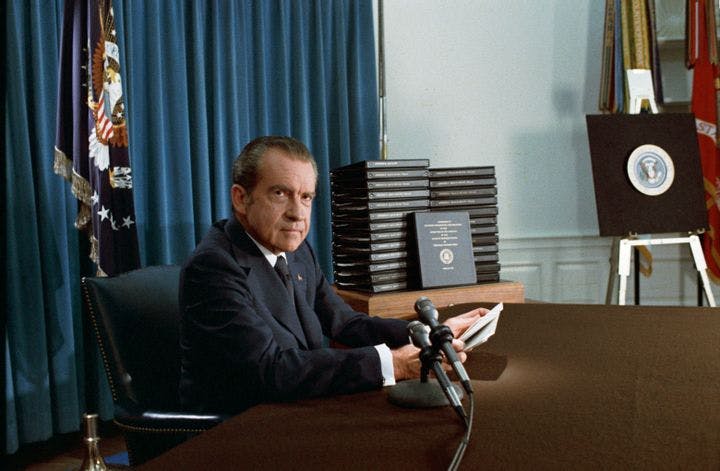Summer 2008
Day of the Jackal
– Matthew Dallek
Matthew Dallek on the Nixon era.
In 2001, historian Rick Perlstein published Before the Storm, which examined the conservative ascendancy through the lens of Barry Goldwater’s 1964 White House run. Now comes the sequel, Nixonland, in which he explains how Richard Nixon emerged in the Goldwater aftermath as the unscrupulous tribune of a “silent majority” infuriated by the social instability gripping America.
Though the style is overwrought, Nixonland is, at times, an eloquent narrative of a society in chaos. Perlstein argues that Nixon capitalized on that unrest—crime, rioting, pornography, “women’s liberation”—to win the presidency. Appropriating the tactics and strategies of conservative leaders such as California governor Ronald Reagan and Alabama’s George Wallace, Nixon used racial codes, patriotic symbols, and get-tough language to appeal to suburbanites who sought the restoration of order to their streets and college campuses.
Nixon’s appeal to the “silent majority” and his us-versus-them brand of politics is by now a relatively familiar story. Yet, with an anthropological eye for detail, Perlstein mines news articles, numerous historical monographs and books of the period, and, to a lesser degree, archival documents to capture vividly the rage that animated this era’s politics among both conservatives and the New Left.
Hardhats clubbed antiwar demonstrators in New York City, and Nixon’s vice president, Spiro Agnew, emerged as a “law-and-order vanguardist” who railed against campus ruffians and attacked the liberal media as “nattering nabobs of negativism.” The National Guard, rifles and bayonets at the ready, cracked down on protesters at the 1968 Democratic Convention in Chicago while chants of “kill the pigs!” went up as police waded into the crowds.
But there is a cartoonish and ultimately unconvincing quality to Perlstein’s portrayal of political figures. Nixon is purely Machiavellian. Agnew is irredeemably vicious. George McGovern is utterly incompetent. Politicians of all stripes are depicted as lacking substantive ideas about public policy and foreign affairs. The Left and the Right are united only by their incivility and contempt for the other side. Human decency is virtually absent from these pages.
There are other problems as well. The narrative tends toward the grandiose, as if an already dramatic storyline had to be written with big and bold strokes to capture the tenor of the times. Perlstein italicizes (“Agnew hated beards”). When Nixon aide John Erlichman warned administration official Leon Panetta to stop saying that Nixon favored civil rights, Perlstein needlessly deadpans, “Silly Leon.” Nixon is described as “lustily” pursuing his goals.
Still, Perlstein’s history of violence in America—of street crime but also ideologically charged attacks on Americans by other Americans, and their effect on electoral politics—is a stark reminder of the bitter divisions of the Lyndon Johnson–Nixon years. Despite its overreach, Nixonland is an important work of synthesis, capturing a moment when ideological, racial, gender, and moral conflicts rent the electorate. While issues including class tensions, the growing influence of the Sunbelt in presidential politics, and Nixon’s foreign policy receive short shrift, Perlstein provides a thorough and provocative analysis that reinforces, with a wealth of detail, the roots of conservatism’s successes.
Whether American politics is still defined by the violence of Nixon’s age, as Perlstein concludes, is debatable. Nonetheless, public morality did emerge as a dominant factor in American politics in the late 1960s. The Watergate scandal ultimately derailed Nixon’s career. But his Republican successors moved in to pick up the pieces, and Nixonland is a bracing reminder of how some divisions from Nixon’s presidency continue to haunt debates about abortion rights, flag pins, and gay marriage—issues likely to play a part in presidential politics for the foreseeable future.
* * *
Matthew Dallek, a fellow at the Wilson Center, is the author of The Right Moment: Ronald Reagan's First Victory and the Decisive Turning Point in American Politics (2000).
Reviewed: "Nixonland: The Rise of a President and the Fracturing of America" by Rick Perlstein, Scribner, 2008.
Photo courtesy of Wikimedia Commons
